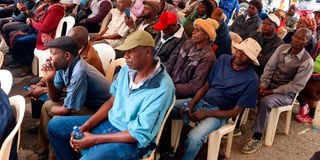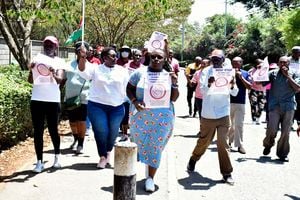
Residents of Mowlem, Nairobi during an engagement with County government officials on September 5, 2024.
For generations, thousands of landowners in Nairobi’s Eastlands have been locked in a gruelling and emotionally draining struggle for title deeds revolving around land valued at Sh54 billion.
The 818-acre property, LR No 11379/3, was originally purchased by the Kiambu Dandora Farmers Company Limited (KDFCL), whose 225 shareholders have spent decades fighting for, in a battle aggravated by hundreds of new claimants that officials of the company say were corruptly awarded papers by influential persons.
Original shareholders and their descendants had thought the victory of KDFCL over a splinter group — Dandora Housing Schemes (DHS) — that had also claimed the prized land on which the Mowlem estate is situated, would mark the end of their woes, only to encounter the latest setback.
As Mr Mwangi Karanja, the company secretary for KDFCL, flips through decades’ worth of legal documents, he laments that generations have passed without resolution.
He himself, now a grandfather, is caught up in a fight that began in his grandfather’s time. The lengthy legal tussle, Civil Case No. 1348 of 1972, has seen over 30 judges handle the case, including Supreme Court Justice Mohammed Ibrahim.
The ownership fight has been steeped in violence and murders. Over 50 people have lost their lives as rival factions clashed.
Among the high-profile murders is that of Stephen Mugo Mutothori, a former Nyeri town mayor, who was shot dead at close range by someone who had paid over Sh3 million for land that never materialised. The land has also been the operating field of Mungiki, who have been “protecting” it and charging owners “protection fees”.
Although authorities are beginning to solve these complex land grievances, the process has been painstakingly slow, with over 170 cases filed at the High Court. The government, through the Ministry of Lands, has embarked on formalising land ownership in settlement schemes across Nairobi, aiming to resolve issues in areas where there are complications in titling.
In 2017, then National Land Commission (NLC) vice-chairperson Abigael Mbagaya Mukolwe gave orders to allow for the regularisation of the subdivisions of the land in favour of KDFCL, “to allow their members to acquire valid ownership documents over parcels in which they are in occupation of and vacant parcels of land”.
However, this determination was not the end of battles for KDFCL members, especially those who bought shares on blocks 163, 215 and 242 part of which are in Mowlem.
Director of land administration at the Lands ministry, Gordon Ochieng, acknowledged that KDFCL are the holders of title deed LR No.11379/3 for 818 acres.
“Going by a 2017 NLC determination that the parcel of land belongs to KDFCL, the ministry commenced titling landowners who had bought from KDFCL,” he explained. The determination also revoked all illegal titles on the land.
Later in 2023 the Environment and Land Court ruled that NLC does not have the authority to revoke title deeds, particularly on land that has never been public or government land.
“The power to revoke titles is vested in the registrar and not the commission which can only recommend,” said Judge Addraya Dena. This opened the floodgates for many interested parties.
Barely a week ago, Njiru Deputy County Commissioner George Kamweru said: “Land in Nairobi has been a highly emotive issue. Over the last year, we’ve worked with both national and county governments to help landowners engage with each other and gain ownership documents through the land regularisation process.”
Speaking at a public gathering in Mowlem, he announced that residents would be the latest beneficiaries of the Ministry of Lands' regularisation exercise, with support from the Ministry of Interior. “I urge all concerned parties to agree to regularise these settlements, as it is the only way to secure land ownership in Nairobi.”
This news was a welcome relief to landowners in Mowlem, many of whom are shareholders of KDFCL. After holding onto share certificates for over five decades, they were overjoyed at the prospect of finally gaining legitimate ownership. Ministry of Lands officials have already resurveyed the area.
While the Ministry of Lands pushes for a resolution, KDFCL officials claim that hundreds of illegitimate titles were issued to non-members. The directors fear that surrendering the mother title will legitimise the claims of non-members, making the regularisation process even more contentious.
The Ministry of Lands and other government departments that have had interests on the land are also to blame for the over half-a-century legal tussle. Strangers introduced as some of the beneficiaries in the ongoing regularisation exercise by the government through the Lands ministry has complicated matters. There are more claimants to the land, over 700, who are not in the register of the land buying company.
According to Mr Ochieng, the regularisation process of Mowlem should have been concluded by now were it not for the reluctance of KDFCL directors to surrender the mother title deed. Other schemes like Kamulu, Njiru and Drumville had already surrendered their mother titles, he said.
“When KDFCL requested that the Ministry of Lands process title deeds for the sub-plots, we asked them to surrender the mother title, which they have not up to now,” Mr Ochieng said. “It is like the company officials’ fear that if they surrender the mother title they will have nothing to hold onto.”
According to Mr Karanja, about 700 title deeds belonging to non-members were sneaked into the mother title. There are also additional titles that keep on being issued through subdivisions, further complicating the issue, he said.
“The Ministry of Lands had already done some excisions earlier and issued title deeds to non-members and those non-members have now taken us to court. We are fearing if we surrender the mother title, we will legitimise their claims,” said Mr Karanja.
“We cannot surrender the mother title, unless they revoke those title deeds they had issued to non-members. And they know those title deeds because they have the list, it was published by NLC on December 2, 2015.”
The Mowlem scenario is similar to what to that of Embakasi Ranching. It is said that in 1978 the then manager of Juja Sisal farm and a former MP, both deceased, handed the original title deed and the list of the company’s employees for subdivision and issuance of title deeds. The emergence of Embakasi Ranching is said to have been the culmination of a betrayal that left out the would-be beneficiaries living in squalor.
In an exclusive interview on September 9, 2023, Embakasi Ranching chairperson Phidelis Wangari said that the company’s share register had mutated, with a huge numbers of beneficiaries whose shareholding could not be accounted for.
“There are a dozen versions of that share register... The one we have containing both primary and secondary shareholders indicates we have increased from 3,000 to 35,000. But during the recent titling drive ordered by the President, documents emerged from the Lands ministry indicating that we are 50,000. That is the elephant in the room. How the 3,000 figure evolved to those tens of thousands,” she said.
It the midst of all the confusion and costly legal battles, some landowners have been lucky to, after so many decades, get title deeds.
“I’ve lived here for over 20 years, and ownership has always been a battle. All I had was a share certificate from KDFCL. But thanks to this process, I finally have my title deeds, and I feel truly settled,” said Morris Kasyoki a resident of Umoja 3.
“With a title deed, I can take out loans, and my children are guaranteed a legitimate inheritance.”
Willy Mwangi, a trustee and one of the KDFCL directors, urged landowners to follow the official process to obtain title deeds.
“Landowners must pay for the subdivision scheme approval through the Ardhisasa portal or the ministry’s banking hall. After that, they will receive a lease document, which a lawyer will stamp to confirm ownership before it is processed into a lease title at the Ministry of Lands,” Mr Mwangi explained.
Over 7,000 allotment letters are now ready for collection, with an estimated 8,000 people set to benefit.
“Once landowners have paid for the subdivision approval, the process concludes with the government issuing a certificate of lease,” he said.
Even as the push and pull over the regularisation exercise continues, KDFCL and DHS are back in court, battling over who among them the Environment and Land Court at Milimani should vest the entire 818 acres on. The case is pending before Justice Anne Omollo and is scheduled for hearing from November 7. Interestingly, according to court documents, some of the properties have been developed by parties linked to Al-Shabaab.
On October 20, 2021, former President Uhuru Kenyatta had said that geo-referencing of land parcels will bring to an end the issuance of fake title deeds. He further said that the exercise, which is a part of the digitisation programme, had unearthed deeply-rooted illegalities, including the improper allocation of government-owned land to private citizens.
“For 125 years, our land registry was manually managed and very messy. In fact, some of this mess was deliberate, engineered to facilitate land theft and corruption,” he said.
Mr Kenyatta stated that government was in the process of cleaning title deeds to ensure they have corresponding geographical co-ordinates in an effort to stamp out fake titles and restore the sanctity of the title deed.
The exercise includes cross-referencing coordinates recorded on existing title deeds against an in-built cadastre on the Ardhisasa land management system to identify its exact location. This meant that for every parcel of land on paper, there should be a physical piece of land on the ground.
This would ensure that all parcels which are located on public land, road reserves, riparian land and other government-owned parcels are not available for transaction, Mr Kenyatta assured.
Additional reporting by Richard Munguti









